 Petzlover
Petzlover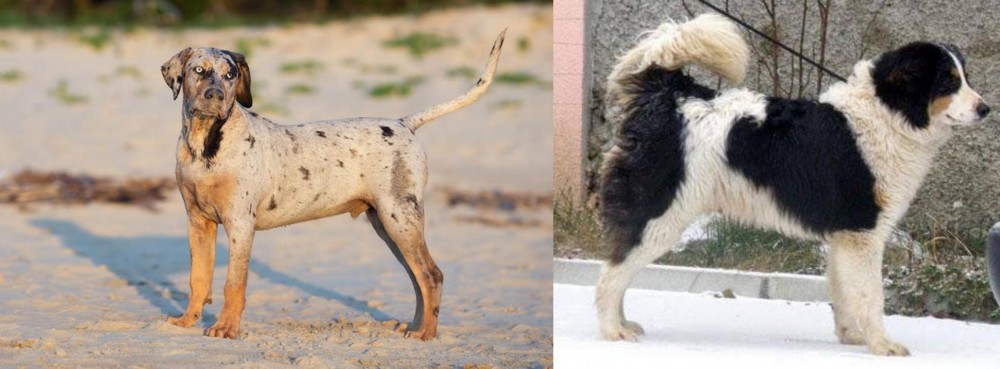 Catahoula Cur is originated from United States but Tornjak is originated from Croatia. Both Catahoula Cur and Tornjak are having almost same height. Both Catahoula Cur and Tornjak are having almost same weight. Both Catahoula Cur and Tornjak has almost same life span. Catahoula Cur may have more litter size than Tornjak. Catahoula Cur requires Low Maintenance. But Tornjak requires Moderate Maintenance
Catahoula Cur is originated from United States but Tornjak is originated from Croatia. Both Catahoula Cur and Tornjak are having almost same height. Both Catahoula Cur and Tornjak are having almost same weight. Both Catahoula Cur and Tornjak has almost same life span. Catahoula Cur may have more litter size than Tornjak. Catahoula Cur requires Low Maintenance. But Tornjak requires Moderate Maintenance
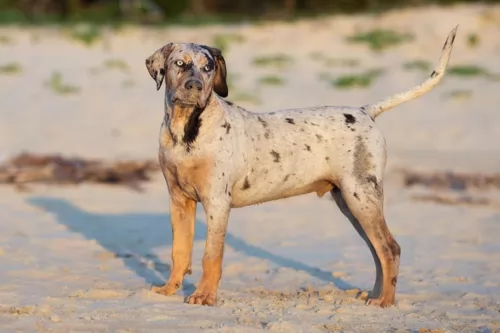 The Catahoula Cur is also known as the Catahoula Leopard Dog or the Louisiana Catahoula. The dog hails from Louisiana, United States.
The Catahoula Cur is also known as the Catahoula Leopard Dog or the Louisiana Catahoula. The dog hails from Louisiana, United States.
It is thought that the Catahoula Cur or Catahoula Hound as it is also known, used to be a hunting dog. The first settlers in Louisiana needed a strong dog to help them with hunting wild hogs and they bred their dogs with other dogs belonging to the locals. This gave them a strong, resilient dog that could take on the wild hogs and also protect their livestock.
Dogs who have no doubt been brought into the mix to produce the Catahoula Cur are mastiffs, Beaucerons, sighthounds and wolves.They are today more commonly referred to as Catahoula Leopard Dogs.
 Known also as the Bosnian and Herzegovinian, the Tornjak dog hails from Croatia and Bosnia and is a large mountain sheepdog.
Known also as the Bosnian and Herzegovinian, the Tornjak dog hails from Croatia and Bosnia and is a large mountain sheepdog.
It is thought that this protector of livestock dog has been bred from the Tibetan Mastiff. He is an ancient breed because there are records of its existence coming as far back as the 11th century.
As a working dog, his role of guarding sheep became less and the dog’s numbers diminished. It was during the 1970s that the breed was revived.
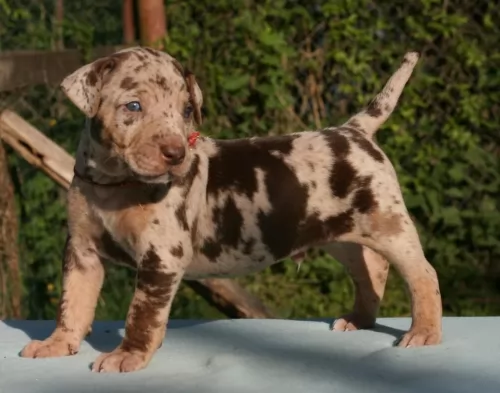 There are varying sizes for Catahoulas and a typical height is 51–66cm and weighing anything from 18 – 51kg. These Cathoula Cur’s come in different colors too, but the leopard-like coat is a dominant feature with this dog.
There are varying sizes for Catahoulas and a typical height is 51–66cm and weighing anything from 18 – 51kg. These Cathoula Cur’s come in different colors too, but the leopard-like coat is a dominant feature with this dog.
While there are solid colors, you can expect red- and blue merle, grey-, black, patchwork and brindle too.
The length of the coat varies somewhat too and while the coat is essentially short and smooth, there are Catahoulas where the coat is a little longer and more coarse.
The eyes of the Catahoula Cur are another interesting feature and both eyes can be the same color, but in some instances the one eye can be brown while the other could be blue, green or gray. The ears of the Catahoula Cur are medium in size and are floppy, dropping down close to the head.
The Catahoula Cur is an intelligent dog and also active and full of sports. You can’t call this dog aggressive, but merely assertive, being strong-willed. He is also affectionate and loyal, loving to spend time with his human family.
He makes a wonderful family pet, complete with children as well as other pets in the home, more so when he has been trained and socialized. These dogs are bright and alert and they also make excellent watch dogs. People who have owned a Catahoula Cur will tell you that these are wonderful pets, full of life and personality.
 This is a large, strong dog, standing at between 58 and 72cm in height and weighing between 28 and 50kg. He has a long, thick coat which has always protected him from the harsh winters of the countries he comes from.
This is a large, strong dog, standing at between 58 and 72cm in height and weighing between 28 and 50kg. He has a long, thick coat which has always protected him from the harsh winters of the countries he comes from.
Common colors for the coat are mainly white with tan, brown, grey or black markings.
The Tornjak is a beautiful dog and also calm by nature, well balanced, intelligent and self- confident. His calm nature doesn’t stop him from being a good watchdog though as he is also alert and brave.
He is more than willing to please his owner and is able to be trained and socialized with ease.
He is a social dog and just loves spending time with hs human family. Therefore efforts should be made not to leave him alone for long periods of time. He forms strong bonds with them and is loving and devoted. Because of his size and energy he won’t suit life in the city on a small property but will be better suited to life in the countryside.
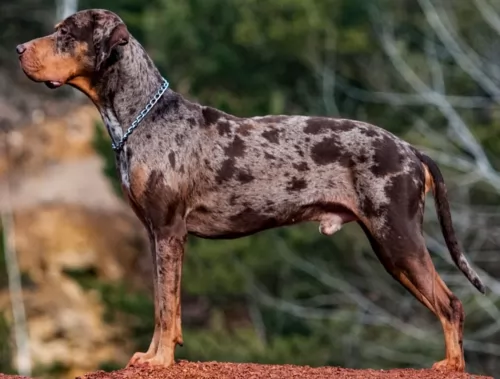 Catahoula dogs are the kind of dogs that make perfect family pets as they are all rounders. They’ve got characteristics that everybody wants in a dog. They are naturally protective, even they are not described as aggressive dogs. With training and socialization they get on well with children as well as other pets in the home. He is alert and territorial, which makes him a good watchdog, more so because he doesn’t particularly like strangers.
Catahoula dogs are the kind of dogs that make perfect family pets as they are all rounders. They’ve got characteristics that everybody wants in a dog. They are naturally protective, even they are not described as aggressive dogs. With training and socialization they get on well with children as well as other pets in the home. He is alert and territorial, which makes him a good watchdog, more so because he doesn’t particularly like strangers.
Intelligent and independent, training makes him wonderfully obedient and relaxed. However, give him the chance for ball games and a walk, and he is more than ready.
He is used to being a guard- and hunting dog, and this makes him an active, energetic dog. You will need to give him plenty of activities if you don’t want this amicable dog becoming anxious, frustrated and destructive.
Exercise him well, provide him with nourishing, top quality food together with fresh water and shower him with the love and attention he deserves as a family member. You’ll also join the ranks of Catahoula Cur owners who want to tell others about what an awesome pet he makes.
 With their human family, they become attached and loyal, not wanting to be separated from anyone for too long. Give him the care this beautiful dog deserves and he'll make you a splendid pet and companion.
With their human family, they become attached and loyal, not wanting to be separated from anyone for too long. Give him the care this beautiful dog deserves and he'll make you a splendid pet and companion.
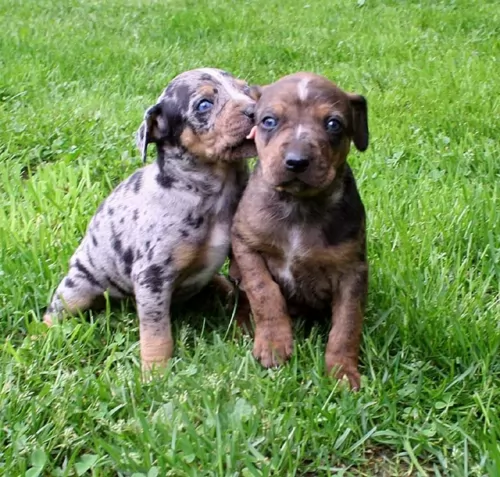 When you buy a Catahoula Cur, you can know that your pet is going to be fairly healthy, however there will be some common health issues to look out for, and by knowing about these health concerns, you can be better prepared.
When you buy a Catahoula Cur, you can know that your pet is going to be fairly healthy, however there will be some common health issues to look out for, and by knowing about these health concerns, you can be better prepared.
Your Catahoula Cur will be susceptible to some bacterial and viral infections which can be life threatening for him if he gets them. Some of these are parvo, distemper and rabies. That is why it is important to have your pet vaccinated, which can start at about 8 weeks of age for a puppy.
Obesity is a world-wide problem with humans and with their pets and it can open up a whole lot of problems with your pet’s health that he otherwise might not have got. It can play havoc with your pet’s digestion, and it can cause joint problems too.
It can be so tempting to pop a sweet treat into your pet’s mouth because you love him so much, but get to know what foods can actually be hazardous for him.
 Most dogs face one or two health challenges in their lives, but most Tornjaks are healthy and won’t easily get sick.
Most dogs face one or two health challenges in their lives, but most Tornjaks are healthy and won’t easily get sick.
They’re large dogs so they typically don’t live as long as small dogs. They can live to be between 10 and 12 years of age.
This is a dislocation of the kneecap, caused by an injury or it can be present at birth. It can cause pain and a limp.
This is a joint condition that is more often seen in large dogs. The ill-fitting joint rubs and chafes, and osteoarthritis and more pain is the result.
You will have to speak to your vet about relieving the pain for your dog and making him more comfortable. Don’t think hip dysplasia is something only old dogs get – it can develop with young dogs – even puppies. Your veterinarian will examine your pet and suggest different medical and surgical options.
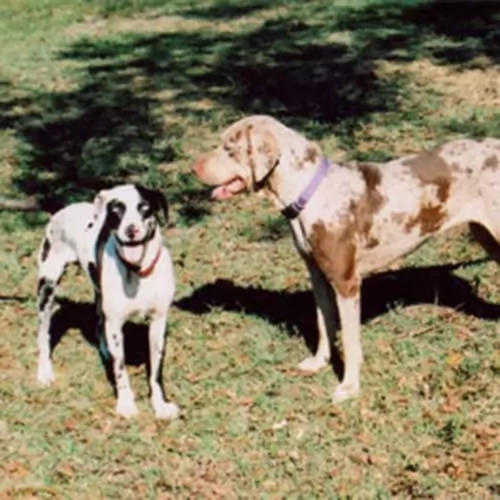 Your Catahoula Cur isn’t a high maintenance dog and a good brushing 2 times a week will keep his leopard coat looking shiny and free of loose hairs.
Your Catahoula Cur isn’t a high maintenance dog and a good brushing 2 times a week will keep his leopard coat looking shiny and free of loose hairs.
Catahoula’s have good teeth, and you want to keep them that way by brushing them at least 2 or 3 times a week to prevent dental decay and a host of other medical issues.
 The Tornjak needs exercise every day to keep him fit and happy. He will love it when you take down his leash for his daily walk. He is a social dog and will want to be involved with all your activities. He gets on well with other dogs too.
The Tornjak needs exercise every day to keep him fit and happy. He will love it when you take down his leash for his daily walk. He is a social dog and will want to be involved with all your activities. He gets on well with other dogs too.
The Tornjak will require quite a bit of grooming because the hair is fairly long and it sheds. Some dog owners have the hair cut by a professional groomer. Regular brushing certainly helps to reduce lots of dog hair flying around.
The insides of his ears need to be checked for signs of redness as well as the eyes. The eyes should be checked for pus and redness. Occasional dog nail trimming will also be required.
Provide your Tornjak with top quality food. If you feed him with one of the commercially manufactured foods, make sure it is one of the better brands. The inferior brands are filled with bad ingredients that can actually make a dog sick.
Try to include some home-made food which can be added to the dry kibble twice a week as a treat. Avoid human foods such as chocolates, grapes, onions, peanuts and chips as these can give him stomach pain and more vet bills for you.
Stick to wholesome, simple foods such as boiled chicken, brown rice or pasta and spinach, sweet potatoes and carrots. Your Tornjak will love it and it will ensure he has bright eyes ad a wagging tail. Never leave him without a constant supply of fresh, cool water.